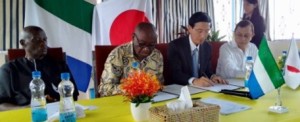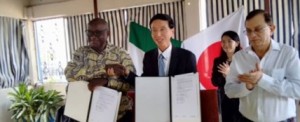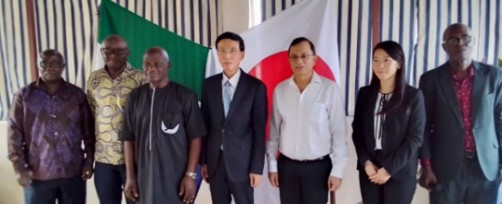By Abubakarr Harding
In a bid to mitigate land degradation, combat declines in soil fertility, address climate change, curb deforestation, and reduce CO2 emissions, the Embassy of Japan in Sierra Leone sealed a grant contract of US$72,086 with the local Non-Governmental Organization (NGO) Sierra Grass-roots Agency (SIGA) on Wednesday, November 15, 2023, at Kissy Dock Yard, Freetown. This collaboration falls under the Grant Assistance for Grassroots Human Security Projects (GGHSP), focusing on the “Improvement of Cassava Processing Center at Mile 91.”
The Deputy Minister (2) of Agriculture and Food Security, Sahr Hemore, extended sincere appreciation to the Ambassador of Japan, for acknowledging the invaluable support provided by Sierra Grass-roots Agency (SIGA) to farmers dependent on the Cassava Processing Center in Mile 91.
He hailed the shift towards sustainable energy, particularly solar power, as a pivotal step in addressing deforestation and making significant progress.
The Minister noted that the Grant Assistance for Grassroots Human Security aims to empower communities to be self-sufficient in basic essentials, aligning with the United Nations’ Sustainable Development Goals, especially Goal 7 (Affordable and Clean Energy) and Goal 13 (Combating Climate Change).
He envisioned the Cassava Processing Center becoming the nation’s first climate-friendly and economically viable facility, eliminating the use of petrol and firewood, which contribute to deforestation and pollution.
Expressing his gratitude, His Excellency Mr. Hisanobu Mochizuki, the Ambassador of Japan, thanked and appreciated Sierra Grass-roots Agency (SIGA) for their ongoing support to farmers reliant on the Cassava Processing Center in Mile 91. He commended SIGA’s foresight in expanding the center’s activities through the initiative backed by the Japanese Government, emphasizing the potential for significant improvements in the lives of the local community and steering Sierra Leone towards a more sustainable future.
Ambassador Mochizuki highlighted the environmental consequences of relying on non-renewable energy sources at the processing center, stressing the global impact of deforestation and climate change. He celebrated the shift towards sustainable energy, specifically solar power, as a crucial step in addressing deforestation and making substantial progress.
Revealing the broader significance of the project, Ambassador Mochizuki underscored Japan’s commitment to aiding Sierra Leone in sustainable development, economic expansion, and the enhancement of living standards. He emphasized that the Grant Assistance for Grassroots Human Security aims to make communities self-sufficient in basic essentials, aligning with the United Nations’ Sustainable Development Goals, particularly Goal 7 (Affordable and Clean Energy) and Goal 13 (Combating Climate Change).
The Executive Director of SIGA, Vidal Robert, shared insights into the project’s components, including the installation of a 30KVA solar system, construction of an underground water collection system, and installation of an electric gari fryer. He envisioned the cassava processing center becoming the country’s first climate-friendly and economically viable facility, eliminating the use of petrol and firewood, which contribute to deforestation and pollution.
Robert emphasized the project’s potential to reverse the decline in land productivity caused by deforestation and pollution, contributing to global warming. He highlighted the economic benefits for farmers, as the project would reduce processing costs by eliminating the need for firewood or petrol.
In conclusion, Robert expressed gratitude to the Government and people of Sierra Leone for the impactful contribution to livelihood improvement and poverty alleviation. The collaborative efforts between Japan and Sierra Leone date back to 2016, demonstrating a sustained commitment to the welfare of Sierra Leonean farmers.






